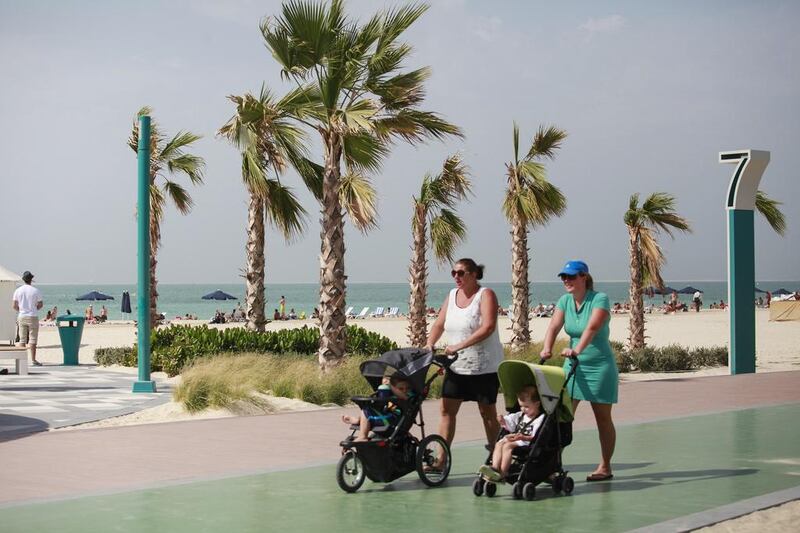In March, The National challenged readers to go out and do just that, and try to get fitter and healthier by walking 10,000 steps a day. A month later, how did the participants in our #startwalking challenge do?
Our readers walked almost twice around the Earth last month as part of The National’s #startwalking challenge.
During March, we challenged readers to walk at least 10,000 steps a day – the basic level of exercise recommended for people with sedentary lifestyles.
Four of those who reached this target would win Dh1,000 in shopping vouchers, and the reader with the most steps would win Dh10,000 in vouchers.
UAE residents know better than anyone how easy it is to let themselves go. We spend all day sitting down: sitting down in the office, sitting down in the car, sitting down at home.
Unlike larger cities in Europe, such as London or Paris, where people tend to walk and use public transport, UAE residents spend much of their time sitting down. Even at bus stops, we sit. Doctors know far too well how damaging such lifestyles can be.
Almost a fifth of the UAE’s population is diabetic, and while the World Health Organisation estimates about a third of the world’s population to be overweight, the UAE’s is about two-thirds, according to a 2013 study by the University of Washington.
All is not lost, however. We may be busy, and the summer heat may make outdoor exercise untenable – if not unbearable – for long amounts of time, but the beauty of the 10,000-step programme is that all of us can fit it into our daily routines.
The UK’s National Health Service says the average person walks up to 4,000 steps a day. Pushing this number up to 10,000 is enough for a middle-aged person to burn off about 400 calories.
Instead of a starting gun, The National’s competition started when entrants downloaded fitness tracking apps – including Fitbit, Jawbone, Misfit and Withings – and registered their devices with the #startwalking challenge.
They then embarked on a month-long walk to fitness, regularly synchronising their devices and sending their information to the newspaper.
Then, with the fiddly technological chores out of the way, readers pushed forwards, challenging themselves to find new ways to fit in more steps – walking the dog, strolling instead of driving, or just taking the time to enjoy a leisurely jog.
As the month went by, they compared their progress to their competitors’ and did their best to climb the rankings.
Many however, failed. Less than a tenth of the participants had a 100 per cent success rate, meaning 90 per cent were not able to walk 10,000 steps every day. But those who did received virtual tickets for the Dh1,000 raffle every time they managed to hit that target.
The average number of steps a day for the competition was 2,000 short of the target. This meant people walked on average 6.1 kilometres, or about the length of Abu Dhabi Corniche.
Of the 411 entrants who regularly shared their data with us, less than a third managed to meet an average of 10,000 steps a day.
However, some of those who did far exceeded expectations, with 11 participants walking more than 30,000 steps a day.
The winner was Ricarte Ricardo Jr, 36, a Filipino who works the night shift at Sahn Eddar restaurant in the Burj Al Arab, Dubai. He walked nearly 2 million steps; or 1,450km – about the distance between London and Warsaw, Poland.
On average, he walked more than 60,000 steps a day, just less than 50km.
Although people have varying stride lengths, 10,000 steps is generally said to be equal to 7.6km, based on an average stride of 76 centimetres. Using this measurement, our competitors walked a total 101,954,000 steps, or 77,485km – a fifth of the way to the Moon.
On average, competitors walked from Abu Dhabi International Airport to Ras Al Khaimah, with 248,063 total steps each, or 188.5km.
Activity trackers have been proven to encourage people to be more mobile.
A review published in the Journal of the American Medical Association in 2007 stated that using a pedometer, or fitness tracker, with a set goal such as 10,000 steps, can boost physical activity up to 27 per cent, lowering body mass and blood pressure.
The devices usually take the form of a small electronic bracelet that records information about the number of steps people take, their sleeping habits and even their heart rates.
This is linked to a smartphone app or computer to which it sends the data.
The National’s #healthyliving initiative previously saw Abu Dhabi residents, including many of the newspaper’s staff, cycling to work in January.
The campaign hopes to encourage residents to start eating better, exercising more and living healthier lifestyles.
Over the course of the month, reporters have found that 30 minutes of light-to-brisk walking every day can reduce risks of a wide range of ailments, from bowel cancer to cardiovascular disease.
halbustani@thenational.ae






